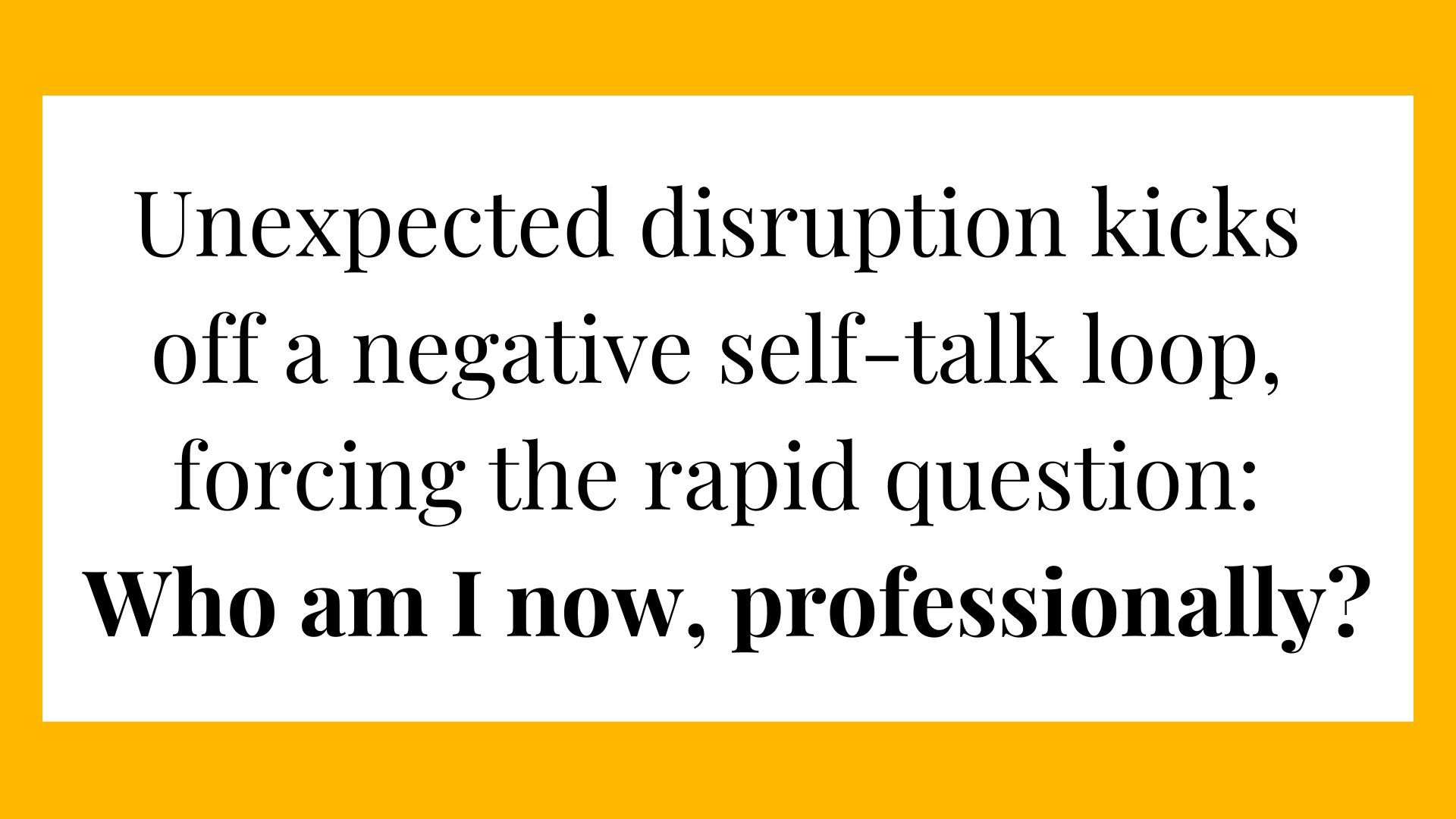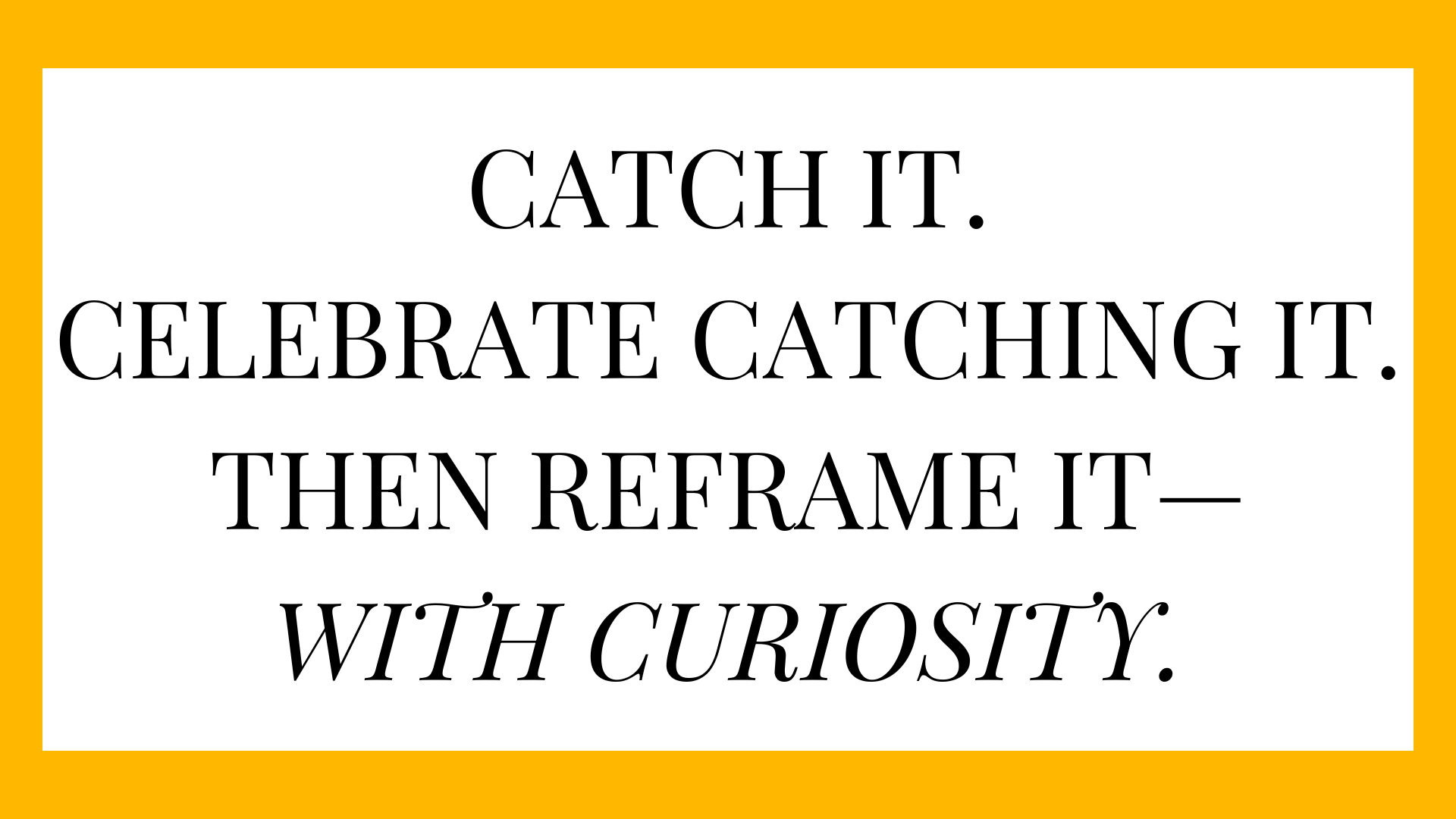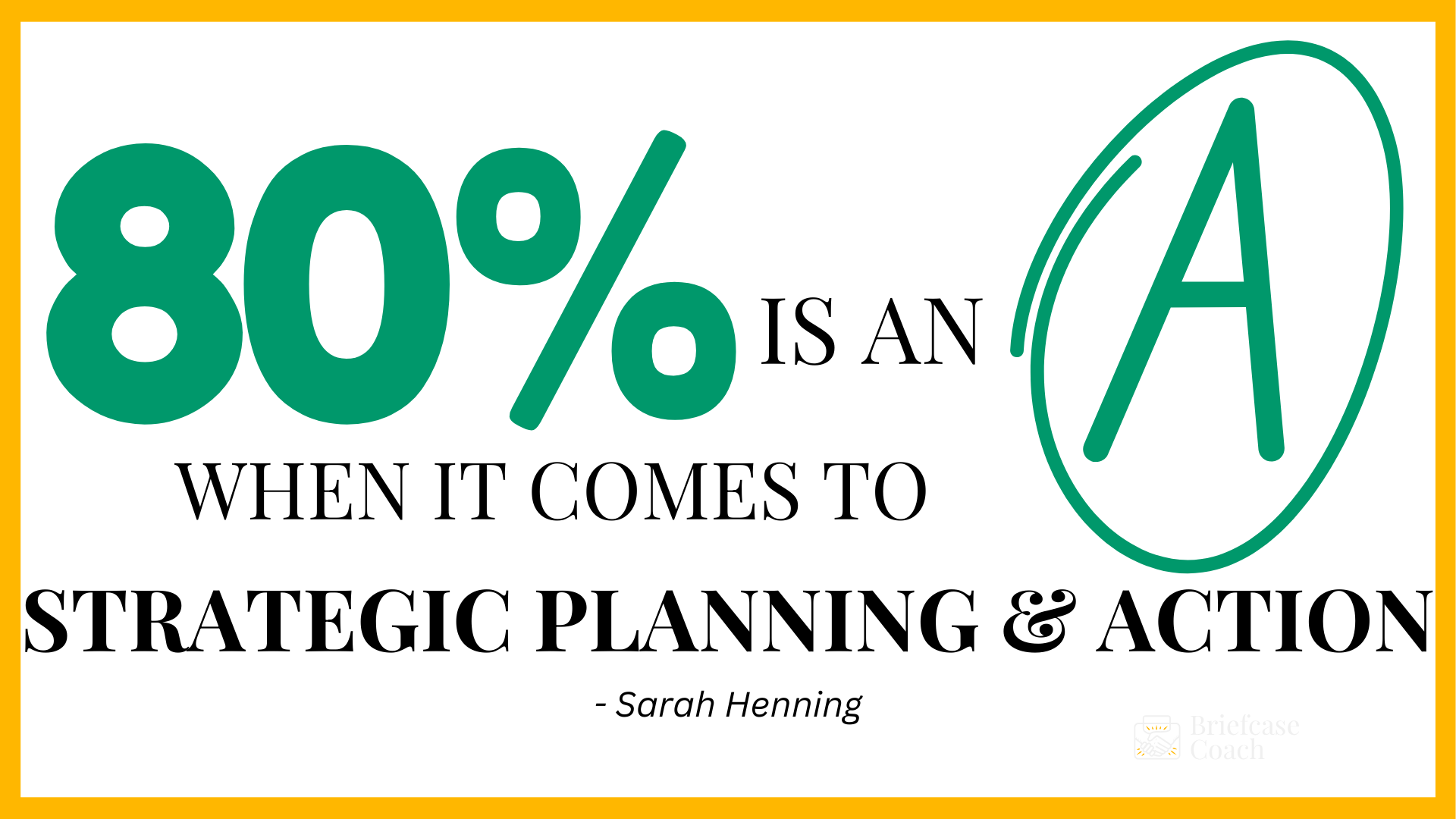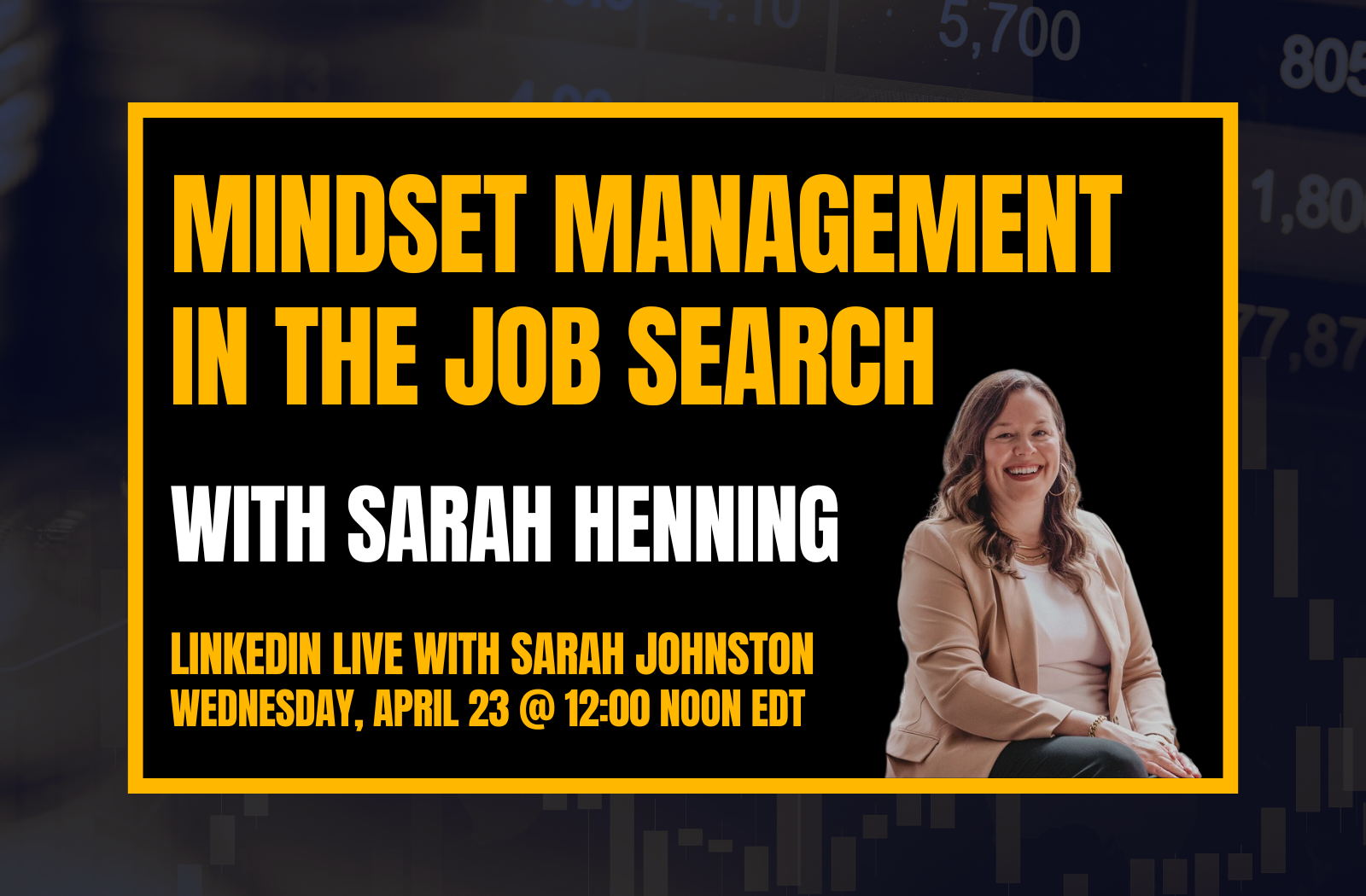A Curated Career Conversation with Sarah Henning

As the founder of Briefcase Coach, one of the world’s leading executive career branding firms, I’ve always valued the opportunity to connect with professionals who are making a real impact in the world of work. Today, I’m joined by Sarah Henning, the visionary force behind Shiftive—a company dedicated to helping high-achieving professionals and teams move from stress and stagnation to clarity, momentum, and sustainable success.
Sarah shares powerful insights on overcoming burnout, building intentional momentum, and creating the conditions for lasting transformation. Her client portfolio spans from Fortune 100 companies to ambitious solo entrepreneurs, and her work consistently leads to measurable, long-term impact. Sarah brings a unique blend of strategic thinking, emotional intelligence, and deep compassion to everything she does, making her a trusted partner to leaders navigating complex professional challenges.
Prefer to watch? See the end of the article for a link to the video recording of our interview.
Mindset Matters: Navigating Executive Job Search with Resilience and Community
Sarah Johnston: Sarah, our conversation couldn’t be more timely. The current news cycle is heavy—recession talk, layoffs, market fluctuations, and AI uncertainty—it’s a lot to take in. No wonder so many people are feeling mentally drained. And as we both know, the job search, especially at the executive level, isn’t just about sending out résumés or prepping for interviews. It’s a layered, often emotional process that can really wear on someone’s mindset.
Since you specialize in helping people ‘work happy and live happier,’ I’d love to start by hearing your take: Why is mindset management such a crucial part of navigating a successful executive job search?
Sarah Henning: I think with a career search or job search—whether you’re just thinking about making a change or you’re actively in it, whether you have a job or not—you’re in transition, right? And anytime we’re in transition, our footing becomes a little offset.
In addition to that, when we’re proactively seeking some kind of change in our life—or creating change for ourselves—it brings an inundation of new information to think about, decisions to make, things to react and respond to. All of that interplays with how our brain processes information, how we take in inputs, and ultimately how our body is going to react. So the control and management of mindset becomes really important in a job search strategy. It helps create a consistent approach to how you’re handling these anticipated disruptions that come your way while you’re searching for a new job.
I think for people at an executive level, Sarah—like the folks you typically work with—it’s additionally important. Their identity is more deeply anchored in their professional role. They’ve often worked longer in their careers and had a laser focus on getting to that executive level. So the tie between personal identity and professional identity is stronger. When that gets disrupted, internal mental scripts can start to get a little wonky.
That’s why having the right mindset—and strong mental fitness—is so important during this process. It ensures that you’re operating as the best version of yourself, and that’s who’s showing up in interviews, networking meetings, and everyday conversations about your career growth and job search.
Sarah Johnston: I think what makes this time especially challenging is that when you think about transition, it’s often a chosen path. You’re choosing to make a transition, setting yourself up for a promotional opportunity or a change. But right now, I’m talking to a lot of people who didn’t make that choice for themselves. The choice was made for them, or in some cases, it happened really suddenly—things were going great, they were winning awards, and then, out of nowhere, they’re faced with unemployment or job instability. How do you fix your mindset when you’re grappling with the emotions of the change at the same time?
Sarah Henning: First of all, my heart goes out to people that are facing all of that. Like you said, in the news cycle, it’s every day we’re hearing about how industry and companies are changing and responding as a result of everything that’s going on in our world. And it’s not that I’m individually impacted by it, but it’s had an emotional toll on me—and it’s had a toll on my mindset. I can’t imagine how it feels for the people going through it.
I think when there’s a disruption that you don’t expect—when someone else has taken away a component of a job or career you’ve had—that kicks off a negative self-talk script that can run on loop while you’re trying to process: What just happened? Why did it happen? What do I do next? And you’re having to rapidly decide: Who am I now, professionally? Who do I want to be? It feels like that, especially if you weren’t expecting it.

So all the things that happen to us in any kind of emergency situation—it’s easy to say, “Well, it’s just a job,” or “It’s just your work.” And yes, it is. But it’s also how you keep a roof over your head. It’s how you feed your family. It’s also how you create a sense of accomplishment for yourself—especially if you loved your job and the work you do, right? And were proud of it.
So when that disruption comes in, your mindset tends to go into a spiral. What happens is our inner judge just goes into overdrive. And we all have an inner judge, right? Even the most positive of us have that critical voice. And that’s okay. “Bad” emotions are still information—they help keep us safe. Like, if you think about putting your hand on a hot stove, your brain is going to go, “Hey, that hurts—take your hand off.” That’s protecting you, that’s keeping you safe.
But what the inner monologue of negative self-talk does is different. It tells you, “Oh, it’s good to keep your hand on the stove—it’s going to help you.” It lies to you. And those scripts—those lies and that negative self-talk—can really sabotage you. They can trick you into moving away from the best version of yourself. And that has a cascading effect. It hinders your decision-making. We know that when your brain is trying to process through—I’ll just blanket it by saying—an emergency situation, which this is, or a crisis, it makes it really hard to get back on track.
So there are a couple of things that are important. One, it’s good to know what tools, resources, and exercises you can use to stop what’s happening and get yourself back on track. And two, it’s really important to have other voices. This is where community comes in. This is where having mentor relationships and people around you who really love you comes in. People who know you well—so they can help feed your mindset and your self-belief with all of the positive things that are also true. So that you can start rewriting some of those scripts that are running through your head—more consistently.
Sarah Johnston: I’ve heard several job seekers tell me recently that they feel inhibited by just negative self thought and rumination and that they are waking up in the middle of the night just thinking about worst case scenarios and planning. How do you advise job seekers to just stop that rumination, stop that negative self talk, and reframe it into something more productive?
Sarah Henning: Yeah, so there are a couple of tools I think are really great. I coach within a framework called Positive Intelligence. Some people here may have heard of Shirzad Chamine—he wrote a book on it and created a science-backed method to help people use Positive Intelligence to optimize how their brain works.
And I went through it first, actually, as a client. You remember that Hair Club for Men line? “I’m not only the President, I’m also a client”? I always feel like that when I talk about this. I hope that wasn’t just a Midwestern thing—hopefully others get that joke.
But when I went through it, I remember thinking, It’s having me do all these things that feel very woo-woo to me—and they’re all rooted in neuroscience.
So, the first step in reshaping your mindset is actually just catching negative self-talk. It’s that simple. If you can just practice catching the negative self-talk and labeling it, that’s the first step.
Like, I’ll use an example from this morning—Sarah, when we had our little hiccup about the time? You texted me an hour before we were supposed to be on, like, “Hey, is the tech working for you?” And I had a lot of other things not going great this morning, so I was already in a little bit of overdrive. And I immediately thought, “Oh no, I just lost another hour. How did I screw this up?”
But then I stopped. I don’t know if I said it out loud, but internally I was like, “Okay, stop—that’s the judge. That’s the saboteur trying to override your brain. Just stop.”
And then the next thing—also rooted in neuroscience—is that you celebrate catching it. I literally say to myself, “Hey girl, proud of you for catching that.” And those two things together—catching it and celebrating—are tied to research on rebuilding neuroplasticity. When you celebrate even the tiniest new habit you’re trying to form, you’re way more likely to stick with it and train your brain to operate in its most optimized state.
So again: Catch it. Celebrate catching it. Then reframe it—with curiosity.

Ask: “What actually could be true here? If I know that voice in my head isn’t telling me the truth, then what actually could be true?”
So I responded to Sarah and said something like, “Hey, I’ve got a lot going on, but I thought we were meeting later today.” And Sarah probably had her own script go off when she realized it was the wrong time.
But that’s where I would start if the cycle feels overwhelming. And listen—if you’re waking up in the middle of the night, those are the kinds of things you actually have to practice during the day to create more mental rest. These are daily reps. And when it comes to neuroplasticity, our brain is like a muscle. It’s an endurance sport. You have to keep doing reps to build strength. So the more you can practice meditation, mindfulness, staying grounded and calm during the day, the more positive results you’ll see when it comes to stress or anxiety interrupting your rest.
Is this going to solve all your problems? No. But it’s about getting your brain back to a place where it’s functioning in an optimized way—where you can look at things clearly, with curiosity instead of panic or stress. That clarity helps you figure out the right next step to take.
And that’s the last tip I’ll give here: If you find yourself spiraling—I’m never going to be able to retire, or I can’t go on, whatever the impact might be—especially for people later in their careers, which I think we’re seeing more of right now—stop and say: “Okay. I know that’s how I feel. But I don’t know if it’s true.” Just say: “I don’t know if that’s going to be true.”
Then ask: “What can I do right now to get on track solving the problem that’s right in front of me?” And take the first next step—instead of staying stuck in the swirl of the big-picture worry.
Sarah Johnston: I want to go back to something you mentioned earlier. You talked about how one of the ways to combat negative self-talk and negative energy is by having a community. I’m a firm believer that job searching is a team sport, and no one should do it alone. For executives, especially, it can be really hard to be vulnerable and open up about the challenges they’re facing—whether it’s with networking, making connections, or dealing with feelings of rejection. They often struggle with this community aspect of job searching.

So, what advice or tips do you have for executives who are listening today, who are thinking, “Okay, yes, I get it, I can’t do this alone,” but are unsure of how to find helpers? Who are these helpers, and what does actual help look like for people?
Sarah Henning: Yeah, yeah. It’s super—the concept of help is really interesting, because it has this inverse response to it. Most people want to help, and most people don’t want to ask for help. It’s super weird, right?
And I think if people know there’s a way they could be of value to you—especially in a time when it’s really challenging for you—I actually believe (and maybe that’s too Pollyanna), but my life experience has been that most people do want to help if they can.
So there are a couple of things I think help reframe this, to help build that community and make the outreach to that community a little bit simpler.
One is using the idea of being curious instead of critical—being curious can really shape how you approach these conversations. So instead of saying, “Hey, I need help,” maybe say, “I’m taking this time to be curious and explore. I want to ask you some questions, share what I’m thinking about, get your feedback and input, and see if you have ideas for me—or people or resources you might connect me with to help me move in the direction I’m trying to go.”
And if you can go into the conversation with that spirit of curiosity—that’s helpful too. I think this is true for me, Sarah, I don’t know if it’s true for you or for others listening, but I’ve had some great conversations where I went in expecting one thing, and a couple of other things happened—things I never even thought to expect—and they were equally as great or even better. So being curious and framing your networking that way not only helps your mindset, it also puts everyone else at ease. You’re just brainstorming together, really. It opens you up to possibility, and it kind of shifts your mindset around what asking for help looks like.
The other thing that curiosity does in your career search is help you be more thoughtful and intentional about what you’re actually looking for, and what you’re asking for. So, whether you’re making a move by choice or not—ask: why am I making this move? What’s possible? What could happen as a result of this?
That kind of curiosity can help you get clear on what you want to look for—things you maybe haven’t considered before because you’ve been so boxed into: “I work in this industry, I have this job title, this is how it looks, this is what the career track is.”
So instead of looking at your disruption as totally negative, can you flip it? Can you say, “Okay, this career disruption, or these challenges I’m having in my search—or even the feedback I’m getting that doesn’t match what I’m hoping for—what’s the information this is giving me?” What is it pointing me toward? Is there something new I’m meant to see? Some new possibility for my future or my career?

Sarah Johnson: I love that so much. And so how do people identify, in your opinion, those helpers, like, how does one think through all of the people that they could actually reach out to for support and help? I mean, there’s the obvious, like your former boss, if you have a great relationship with that person, and maybe if you have good, close friends that are in the same work as you, but but help people think outside the box kind of thinking about centers of influence.
Sarah Henning: Yeah. So Sarah and I were chatting before we started about how we’re both big-time baseball fans, and we have a rivalry that goes back to ’91 because she’s a Braves fan and I’m a Twins fan, and the Twins won the World Series against the Braves that year. But I actually have framed my entire thought process around how you build community as a result of being a baseball fan. And this is not from a person who’s like—I don’t love sports analogies—but because it’s familiar to me, it’s helpful for me.
And when I think about building fans—and I use that analogy—I think about one thing. So there’s coaches, right? Coaches are usually fans of their players, right? So these are people that tend to be a little bit older, have a niche experience or expertise that can help us learn skills, connect with other people, give us insight that we don’t have about the path that we’re on, right? They see it optically from a different seat than we do. So I would be thinking about who are people that could serve as coaches, and I would loosen up the reins on thinking about if they want to help you or not, because, again, most people want to help you. There’s a lot of good coaches that, if you say, “Here are the specific things I am curious about,” or, “I’d like information or feedback on this,” then those coaches know exactly how to plug and play with you, and they probably will be more receptive to helping you in that regard.
The second group that I think about are teammates. So Sarah, you mentioned coworkers who know you really well, and those can be individuals who’ve worked with you currently, in your most recent job, or long ago. It’s interesting to talk to those people when you’re in career disruption especially—or if you have some of those negative loops—going to have conversations with them about, like, “What are the things you saw me do well as a teammate? How would you describe me as a teammate?” Because sometimes they can come up with information for you that are things you didn’t even realize, that they’ve started to understand better with time—how important it was in the context of your work together—and again, they just see us differently.
I think about the fans in the stands that are there to just cheer players on, right? So who are the people in your life that—oh my gosh, I thought I turned it off—I really do feel like a whole person at church—who are the people in your life who really want to see you succeed? They’re cheering and yelling for you. They would buy a ticket to come watch you win, right? And here is where I would encourage you to think about—you want season ticket holders, like perennial season ticket holders. This is where I think you get selective about who you talk to. So it’s not somebody buying a general admission ticket once a year to bring their friend—they’re like, “Yeah, good luck!” These are the people who show up for you consistently and are cheering you on. And the role that they play is really that encouragement, right? Like, we just need people that pour into us in terms of our energy. So think about the people who are really good cheerleaders and can cheer you on.
As you’re looking to get a little more tactical—and less from an analogy standpoint—I also, and this is probably the former recruiter in me, I think if there are other people in recruiting who hear this, they’ll appreciate it—I would encourage people to also network with recruiters. And recruiters in your industry are great, but even if you know a recruiter who’s not in your industry, if it’s somebody, a friend of yours that just works in the area—recruiters help give so much, I think, balance and perspective of what the hiring process really is and can be. They can give you ideas and tips, they can help you practice—practice interviewing if that’s the thing that you need, right? There are a lot of different resources. But recruiters love helping people beyond just the interviewing process, right? So there’s other ways that you can leverage some of those relationships. I think it’s smart for people to have relationships with recruiters so that when the need comes to find a new job, they can leverage not only their network, but a recruiter’s network—which is typically with other hiring teams across industries, across… certainly if they’re a corporate recruiter for a certain area or region, right? Like, that’s another place that you can kind of key in and network with people.
And then the last place that I would say to build community is—there are job search communities, right? That exist and meet up locally, virtually, and in person, to help people with career development. And I think it is helpful to be in a room with people that are on a similar path as you—especially if your career search is taking longer than expected—to kind of just hear: what are other people doing and experiencing? To affirm your experience, but also give you ideas on things you could be trying that you haven’t tried yet.
Sarah Johnson: I love that, and actually, I have a map of national job search clubs, and we will link that in the comments so people could check that out of all the clubs that we’ve identified across the country, because I do think that these groups can be really powerful, and often they’re free, they’re hosted by nonprofits, and they’re full of community members that are helpers. So that’s a great, great, great suggestion, great resource that you got, too, that’s great.
So my last question for you today, Sarah is one that’s kind of something that gets me stuck a lot, and that is embracing imperfection and taking action. I tend to be someone who wants things to be done really well, and I won’t put forward anything unless I feel really good about it, but sometimes we need to take action in order to advance. And so I’m curious, how do you think executives can balance the need for thoroughness and strategic planning in the job search with the need to avoid getting stuck in analysis paralysis?
Sarah Henning: So there’s a couple sort of tools or reframes that I think have helped people that I’ve worked with. One is the concept that 80% is an A when it comes to strategic planning and action. So the goal is to have a plan and be thoughtful—that’s important, right? Like to have a plan with targeted action items that you’re going to pursue. But if you’re thinking about the plan so much that you don’t actually take action, that all you’re doing is refining it or working on something before you submit it, there’s no point in doing the work. No one else has eyes on it. No one else gets to connect with you. Whatever the case might be, right?

So I challenge people—perfection should never be the goal, because as soon as something’s perfect, we find a way to make it better anyway, right? So the first thing I would say is make sure that you’re taking perfection off the table in any goal-setting that you’re doing.
The second is using that 80% tool—or the 80% mentality—to decide when to move forward. So if you have an idea of what perfect looks like, once you get 80% there, take action. Figure out what that move is going to be.
The next concept is—and this is James Clear, he talks about this a lot in Atomic Habits—the power of breaking down to the smallest step what you can do next to start to create action. So if analysis paralysis is something that you’re fighting because of the internal monologues that are going on, or a desire to stay… you know, if you have a sort of internal saboteur of perfectionism or being a stickler that keeps you from moving forward—figure out what the smallest next step is going to be.
My favorite example in Atomic Habits is a gentleman who lost a ton of weight, and the way that he did it was by creating a habit of going to the gym. And the first habit that he created was putting on his shoes every day for a week. That’s all it was. It was literally just putting on his shoes. And after that, he put on his shoes, then he drove to the gym. He didn’t even get out of the car. He just drove to the gym. The week after that, he put on his shoes, drove to the gym, and went inside for five minutes—didn’t even work out—and he kind of just kept going from there.
So the goal is, instead of stopping and saying, “Hey, here’s all the reasons I can’t do this,” or getting stuck in that model, right—catch the judge. “Caught! You don’t think like that.” What else is possible here? And what’s the first next step that I can take to get me moving and creating action and momentum toward what it is that I really want and what I’m really working for.
A big thank you to Sarah Henning for sharing her powerful insights into cultivating a growth mindset. Her perspective on navigating setbacks and embracing challenges as opportunities for growth is truly inspiring.
As you move forward in your own journey, I encourage you to take Sarah’s advice to heart: approach each challenge with the belief that you can learn and evolve. Whether you’re dealing with a personal or professional obstacle, remember that resilience and adaptability are key to moving forward. Cultivating a growth mindset means shifting from seeing failures as roadblocks to viewing them as stepping stones to success.
Now, your challenge: take a moment to reflect on your own mindset. How can you shift your perspective on setbacks or challenges you’re currently facing? Embrace them as opportunities for growth, and trust that you have the ability to rise stronger and more resilient.
I’m excited to hear how these strategies resonate with you and how you’ll apply them to your own growth—let’s keep the conversation going! Share your thoughts in the comments or connect with me on LinkedIn!
Watching recording of the full live interview on LinkedIn here:


